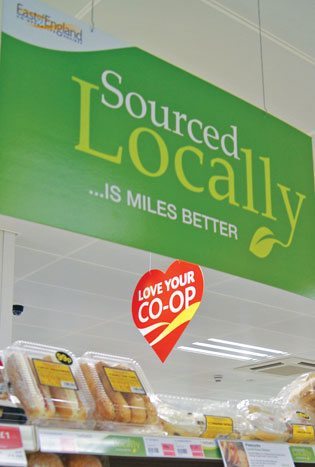As the government’s attempt to reach a post-EU deal takes a dramatic turn with the Chequers summit followed by high profile government resignations, including Brexit minister David Davies, co-op retailers face continued uncertainty.
So far, the sector has coped well with the challenge. The Co-operative Economy Report showed that co-operative retail has been holding up well – but Ed Mayo, secretary general of Co-operatives UK, warns that uncertainty over Europe remains a key concern for every co-operative in retail.
“Brexit affects consumer confidence,” he said. “It also puts a question mark over business confidence, not least in terms of investment for the future. Together with other trends, such as wages and technology, it feels like retail will be in the middle of any storm that comes as a result of the way that Brexit happens.”
Employee-owned business John Lewis Partnership is among those voicing their concern.

In June, the Partnership announced it was selling four Waitrose convenience stores to the Co-op Group and predicted this year’s interim profits before exceptional items will be close to zero. Making the announcement, chair Sir Charlie Mayfield warned about the impact Brexit was having on the retail sector, adding that a “no deal” scenario was “unthinkable”.
Paul Martin, head of retail at auditing and consultancy giant KPMG, said the first level of impact for the retail sector was felt in the immediate aftermath of the referendum. The pound lost value against the US dollar and the euro, increasing the cost for retailers buying in these currencies but lowering it for those selling in them.
“Retailers had a choice to pass on price increases to consumers, negotiate better deals with suppliers or absorb some of these. All three happened,” said Mr Martin.
Related: How can co-ops keep their place on a political agenda dominated by Brexit?
The referendum also saw inflation rise, with the rate now at 2.3%, bringing rising food prices in its wake – while reduced growth in wages in the UK have left customers with less to spend.
However, the first nine months following the referendum vote did not bring a major drop in customer spending, said Mr Martin. Between 65-68% of the UK’s GDP continues to depend on customer spending. Yet household debt is at the same level it was in 2008 and is likely to increase. The year 2017 witnessed a 9.3% growth in consumer credit.
“Consumption is supported by debt – that is not a good sign for the economy,” added Mr Martin.
The worse the trade deal, the more consumers will have to pay
Prices are also interlinked with the weakening of the pound and inflation. KPMG’s analysis around price increase within the retail sector showed an increase across food and non-food of 8%.
The consultancy firm is also looking at the potential impact of a “no deal” Brexit on the retail sector, examining the different trade deal options.
“Whether it is the Norway or the Canada type model or WTO tariffs – whatever happens, the consumer will have to pay more,” said Mr Martin. “The worse the trade deal, the more consumers will have to pay.”
Worse still, he added, Brexit is not the only dimension for UK retailers, with trade wars between the EU and the USA, and China and the USA, also increasing the price of products.
Another factor is the decrease in population growth, which can also result in lower economic growth, he warned.
Leaving the EU will also hit retailers from an employment perspective. Around 170,000 EU nationals are employed within the retail sector in the UK. Similarly, the National Farmers Union (NFU) Seasonal Supply of Labour survey, which looks at seasonal agricultural workers recruited by labour providers, estimates that 99% of seasonal labour is provided by EU workers.
Local sourcing – a real opportunity
A trend in its own right, local sourcing can answer some of the problems faced by food retailers. Co-ops are already championing local food but what changes are likely to occur within supply chains?
Mr Martin thinks Brexit will result in a very competitive price war. “On the one side we will see prices specifically for British products made locally grow up due to the competitive nature of the food retail market,” he said.
“There will be investments, which some players can afford more than others, then there are certain categories where there is not enough volume to service the demand, like wine or tomatoes.”
More co-operation needed in the agri sector
Co-op retailers might be turning towards UK producers, but farmers are still facing uncertainty, particularly when it comes to a replacement for Common Agricultural Policy subsidies.
The Co-operative Economy Report reveals that turnover from agricultural co-operatives has risen 5% to £7.7bn. Agriculture represents over 20% of total turnover in the co-op economy, while agri co-ops have a market share of 6%.
Earlier this year the government announced a £10m fund to support farmer co-operation, but Co-operatives UK says more support is needed.

Richard Self, agricultural manager at Co-operatives UK, said: “This growth is testimony to the resilience of our farming co-operatives – and has been achieved despite ongoing uncertainty in the run-up to Brexit. However, at a time when we need more co-operation and collaboration in agriculture in readiness for leaving the EU, the number of agricultural co-operatives is, in fact, declining.
Related: Co-op Group chief Steve Murrells calls for a co-operative Brexit
“Defra has recognised that the UK is significantly out of step with its international competitors and has indicated its support for more collaboration in the sector. But Defra must ensure the funds it announces are accessible and support the right initiatives in order to help change perceptions and encourage co-operation.”
Co-operatives UK’s membership includes the Organic Milk Suppliers Co-operative (OMSCo), the largest organic dairy co-operative in Europe. The 25-year old co-op says collaboration is key to ensuring the future of the UK farming sector.
“A focus on long-term, strategic partnerships with like-minded businesses globally has helped us develop supply chains overseas and access international markets,” said managing director Richard Hampton.
This approach has seen OMSCo form relationships with US-based Organic Valley, the largest organic co-operative in the world, European organic dairy co-operative Eko Holland, and dairy processor Wyke Farms, with whom they formed the the British Organic Dairy Company joint venture in 2017.
Mr Hampton said: “Although OMSCo’s core business is in the UK, added-value initiatives not only help us to balance fluctuations in UK organic milk supply and demand, but also to build resilience as a business.”
For the financial year-ending March 2017, exports accounted for 21% of OMSCo’s turnover – but Mr Hampton warns there are new hurdles to overcome as Brexit brings potential barriers to trade.
He said: “The figures from this year’s economy report are reflective of the current market conditions and the challenges that lie ahead. Collaboration within the agricultural supply chain and across co-operative memberships will be key to ensuring sector success post-Brexit.”
How to prepare for Brexit?
Paul Martin thinks co-op retailers should take five key areas into account when drawing up plans:
- delivering growth
- cutting costs
- using technology and automation while investing human capabilities into frontline consumer interaction
- continuing to focus on community engagement – a unique selling point
- keeping trends around protection and compliance in mind.
“There is an increasing number of compliance and regulation related themes that co-op retailers might need to address, directly liked with reputational risk,” he said, adding that a recent KPMG survey had shown reputational risk to be a crucial issue for food retailers.
The co-op business model means everyone involved in the business should have a say when embarking on a journey of structural change, he added.

